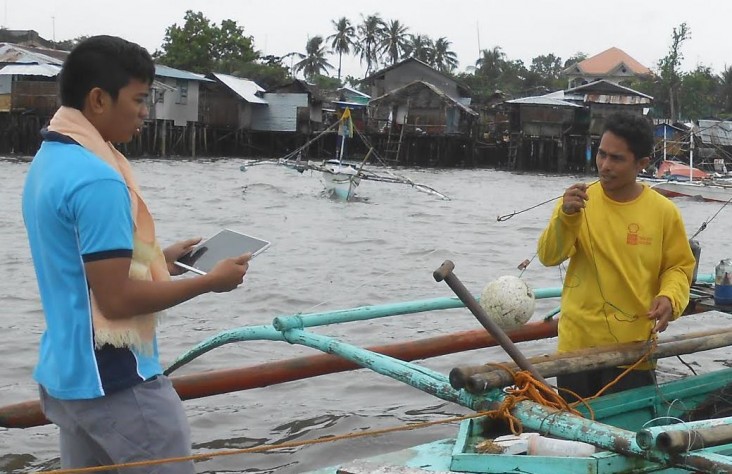
April 2015—Fisheries help fuel the Philippine economy. The country ranks eighth globally in fish production, but overfishing caused the fish population to decrease by 90 percent in the last five decades. Meanwhile, 40 percent of Filipino fishers live below the poverty line. Poor and vulnerable, feeding their families is a daily trial.
Attempts to improve fish populations have fallen short. Since 2004, the Talibon municipality struggled to get fishers to register their activity. The cumbersome process required fishers to visit a government office, all for no immediate benefit.
In 2012, USAID launched the five-year Ecosystems Improved for Sustainable Fisheries (ECOFISH) project to protect biological diversity and boost livelihoods in eight key marine biodiversity areas throughout the Philippines.
Alex Taran works for a small-town government in central Philippines, visiting fishermen and discussing their catches and activity. They welcome him to their boats and talk openly.
Things weren’t always this way.
He recalls an early brush with an illegal fishing suspect. At the time, Taran was just 26 years old and still a new recruit. “He looked at me from head to toe, tapped my neck and said, ‘Don’t be a stickler. You’re still young. You don’t know anything,’” says Taran. He took the suspect’s words as a threat.
Taran joined the Coastal Resource Management Office of Talibon, Bohol, in 2012 to help organize fishers and address coastal and fisheries issues. New in town, the fishing community didn’t trust him. “I felt alone,” he says.
USAID worked with the Bureau of Fisheries to develop the National Program for Municipal Fisherfolk Registration (FishR) in 2013, which provides a number of incentives for fishers to register such as linking registrants to government services like health insurance and funding for alternative jobs. The program also provides government staff like Taran about 35 cents for each verified entry.
Also that year, USAID partnered with Microsoft and the Philippine Department of Science and Technology to introduce a mobile technology that allowed workers to register fishers in the field.
It worked. Previously, only 5 percent of the almost 2 million municipal fishers in the country were registered. By January 2015, the FishR database contained 1.5 million fishers, including 8,300 Talibon fishers, more than 80 percent of its fishers.
Now, fishers like Jomar Brusa, 38, ask to be registered. “Being a card-carrying fisher entitles us to fish in Talibon’s waters and participate in work programs,” he says. During the low season, he plants mangroves for a project organized by the Talibon government.
FishR also helps municipalities enforce fishery laws. “We no longer lose our fishing nets to trawlers,” Taran says. This, he points out, caused fishers to have a change in heart. “They see we are here to help, not take away from them.”
Building on FishR’s success, USAID helped the Philippines develop BoatR, allowing fishers to register their vessels and gear. USAID trained 140 regional and provincial government personnel to manage the program.
Looking ahead, fishers and government workers can participate in a robust ecosystem that provides fulfilling livelihoods and sustains the fish population. And Taran now counts the fishers among his friends.
“We can accomplish more, knowing we are not alone,” he says.
LINKS
Follow @USAID_Manila, on Facebook, on Flickr, on YouTube







Comment
Make a general inquiry or suggest an improvement.